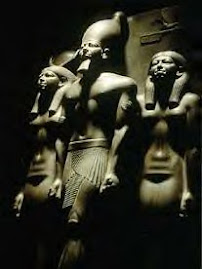Shem Hotep ("I go in peace").
Why do Black Americans embrace Islam?
It was after all,the Muslim Islamic tribes of Africa that sold Black Africans into slavery to begin with.And Muslims still look down upon the black race as inferior.
The Role of Islam in African Slavery.
Part 2 – Using slaves on the African continent.
By Alistair Boddy-Evans.
The most favored of all Islamic slaves seems to have been the military slave -- although performers were the most privileged. By the ninth century slave armies were in use across the whole of the Islamic Empire. The early slave armies tended to be white, taken from Russia and eastern Europe. However, the first independent Muslim ruler of Egypt relied on black slaves and at his death is said to have left 24,000 (white) Mamaluks and 45,000 Nubian military slaves. In north Africa the source of black slaves from Nubia and Sudan were too convenient to ignore. At the time of the Fatimid defeat, in the twelfth century, black troops formed the majority of the army. By the fifteenth century black military slaves were being favored with the use in battle of firearms (the Mamaluks refused to use such dishonorable weapons). Slave troops in Tunisia in the seventeenth century even included cavalry, and the Sultan of Morocco is recorded as having an army of 250,000 black slaves.
Even as late as the mid-nineteenth century, Egyptian rulers actively recruited black slaves into their army -- for example, they were included in the Egyptian expeditionary force sent by Sa'id Pasha to Mexico in support of the French in 1863.
The transatlantic slave trade sent Arab slavers into overdrive, here was a new market which could be exploited. When the Europeans abolished slavery in the 1800's, the taking of slaves in Africa continued. The eradication of such practices was cited as a major justification by the Europeans for the colonization of Africa. Certainly Britain had a significant fleet of ships patrolling the coasts against such slave traders.
Encyclopaedia Britannia's Historical Survey of Slavery1 points out that "The European colonization movement of the second half of the 19th century put an end to slavery in many parts of Africa..." and that "the British turned their attention back to Africa. They moved onto the continent, took control of those governments that were thriving on slavery, and attempted to abolish the institution." Further "in the 1870's British missionaries moved into Malawi, the place of origin of the Indian Ocean Islamic slave trade, in an attempt to interdict it at its source... In Dahomey the French abolition of slavery resulted in the cessation of ceremonial human sacrifice."
Unfortunately this was not enough for "some parts of Africa and much of the Islamic world retained slavery at the end of World War I. For this reason the League of Nations and later the United Nations took the final extinction of slavery to be one of their obligations. The League had considerable success in Africa, with the assistance of the colonial powers and by the late 1930's slavery was abolished in Liberia and Ethiopia". The problem was such that "After World War II the United Nations Universal Declaration of Human Rights ... proclaimed the immorality and the illegality of slavery. Slavery was abolished in most Islamic countries, although it persisted in Saudi Arabia into the 1960's. It finally was made illegal in the Arabian Peninsula in 1962."











